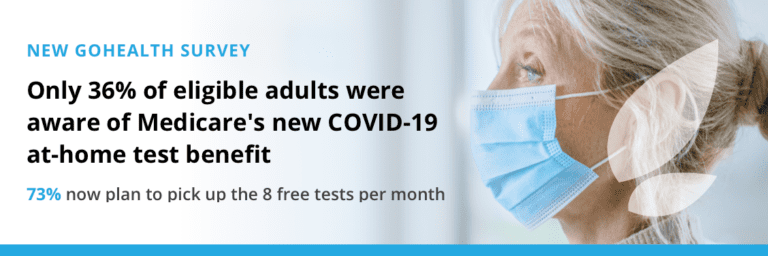Chicago, April 22 — A recent survey of 1,000 U.S. adults, ages 65 and older, indicates that fully COVID-vaccinated older adults are already defining a ‘new normal’ but express uncertainty about fully returning to pre-COVID norms and behaviors. GoHealth, Inc. (GoHealth) (NASDAQ: GOCO), a leading health insurance marketplace and Medicare-focused digital health company, surveyed older adults to learn how life has changed since the COVID vaccine was introduced. At the time of the survey (April 13 to 16, 2021), 65% of older adults were fully vaccinated, and 12% were partially vaccinated. Key findings include:
Of those fully vaccinated, 68% said they will make at least one change to their lifestyle, topped by visiting indoors with fully vaccinated friends and family (42%) and indoor grocery shopping (39%).
Twenty-five percent of fully vaccinated older adults have or intend to travel within the United States.
Ninety-three percent of fully vaccinated older adults said they would continue to wear masks and socially distance in public.
These statistics reflect a cautious optimism among seniors, said GoHealth Chief Medical Officer, Paul Hain, M.D.
“On the one hand, older adults are getting the vaccine and want to visit with friends and family and get back to doing the things they enjoy. On the other hand, many recognize that they still have a responsibility to follow health guidelines,” said Hain. “The vaccine is new, and people have a lot of questions. There’s a lot of good information available for older adults and our seniors, and we know that they’re on the path back to the things they enjoy.”
Getting Back to Normal: Post-Covid Life for Older Adults
Now that all U.S. adults are eligible for a Covid vaccine, older adults are slowly returning to their pre-pandemic behaviors. Aside from visiting with other fully vaccinated people and shopping indoors, fully vaccinated older adults have either started, or are planning to start, the following activities:
- 34% said they would eat inside at a restaurant or bar
- 30% said they would shop indoors for non-grocery items
- 28% will visit doctors or specialists they didn’t see during the pandemic
- 24% will visits dentists or hygienists they didn’t see during the pandemic
On the Road Again: Older Adults Making Post-Covid Travel Plans
Traveling was another popular option for both of the vaccination groups. Among the fully vaccinated:
- 25% said they’d travel within the U.S.; 4% will travel outside the country
Those who are partially vaccinated, or not yet vaccinated, were slightly more willing to travel:
- 28% plan to travel within the U.S.; 8% will travel outside the country
Among all Medicare Advantage beneficiaries that have plans to travel, many incorrectly believed their plans will cover them wherever they go. Medicare Advantage plans often provide limited benefits and coverage when you’re outside your provider network. This generally means emergency and urgent care are covered anywhere in the U.S., but little else. When asked if their Medicare Advantage plans would follow them when they travelled:
- 71% believe their plan will cover them when they travel
- 8% said it would not cover them when they travel
- 21% didn’t know
Vaccines Block Covid — but not Caution
Ninety-one percent of fully or partially vaccinated older adults said they’ll continue to wear masks and practice social distancing in public.
Among those planning to get vaccinated, or who are still unsure whether they’ll get vaccinated, fewer expected to wear a mask or social distance once they were fully vaccinated:
- 8% will not wear a mask after they are fully vaccinated
- 23% don’t know if they will wear a mask after they are fully vaccinated
- 8% will not practice social distancing after they are fully vaccinated
- 13% don’t know if they will practice social distancing after they are fully vaccinated
Anti-Vaxx Sentiments Remain: Reasons for Hesitancy Among Older Adults
Though 65% of respondents were fully vaccinated and another 12% partially vaccinated, a sizable portion of respondents expressed skepticism about receiving the vaccine; 13% have not received a COVID-19 vaccine and don’t plan to. There were several reasons for this.
- 53% “don’t trust the vaccine will work” or believe “vaccines do more harm than good”
- 44% said they are worried about side effects
- 29% said they don’t trust the government
- 23% said they “want to wait and see what happens to others before I decide”
“It’s interesting to see how this population is redefining ‘normal,’” said Hain. “It’s understandable to be cautious, and even hesitant, after everything they have been through for the past year. Our hope is to help them make the best possible decisions about their health. That means answering questions and providing guidance when needed.
“This study shows that normal is going to mean different things to different people. The best thing we can do is provide reliable information and guidance so they can make the right decisions for themselves and their loved ones.”

